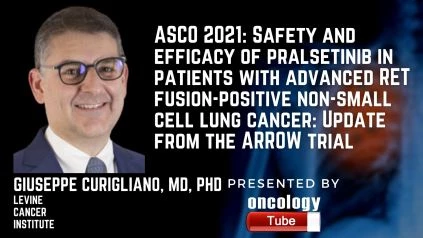Giuseppe Curigliano, MD, Ph.D., is Associate Professor of Medical Oncology at the University of Milano and the Head of the Division of Early Drug Development at the European Institute of Oncology, IRCCS speaks about ASCO 2021 – Abstract – Safety and efficacy of pralsetinib in patients with advanced RET fusion-positive non-small cell lung cancer: Update from the ARROW trial.
Link to Abstract:
https://meetinglibrary.asco.org/record/200463/abstract
Background information:
In 1–2% of non-small cell lung cancers, RET fusions are targetable oncogenic drivers (NSCLC). Pralsetinib, a very powerful oral selective RET inhibitor for RET-altered NSCLC and thyroid cancer, was approved by the US FDA (NCT03037385). The results for a wider group of patients with RET fusion-positive NSCLC recruited in ARROW are presented here.
Methodologies:
ARROW is a phase 1/2 open-label trial that took place in 84 locations across 13 nations. Patients with RET fusion–positive NSCLC were included in the Phase 2 expansion cohorts. Initially, all treatment-naive patients were not eligible for platinum-based therapy, however this criterion was abolished in July 2019 by a protocol change. Overall response rate (ORR; blinded independent central review [BICR] under RECIST v1.1) and safety are the primary goals for patients with baseline detectable illness.
The following are the outcomes:
Patients who started pralsetinib 400 mg QD by May 22, 2020, had their updated analyses completed as of Nov 6, 2020 (data cut-off) (enrollment cut-off). The Table shows the efficacy findings, which include analyses for treatment-naive patients who were included after eligibility criteria were altered to include candidates for platinum-based therapy.
Final Thoughts:
Pralsetinib demonstrated immediate, strong, and long-lasting therapeutic efficacy in patients with RET fusion-positive NSCLC (independent of previous treatments), including patients with poor prognoses who were not suitable for platinum-based treatment. Pralsetinib was generally well tolerated. These findings emphasize the need of RET testing early in the course of illness to identify people who could benefit from pralsetinib therapy.
NCT03037385 is the number for the clinical trial. http://clinicaltrials.gov/show/NCT03037385

